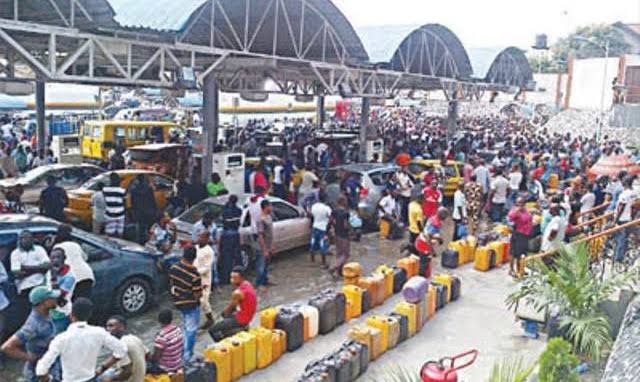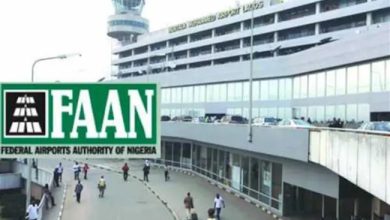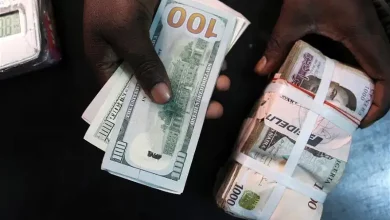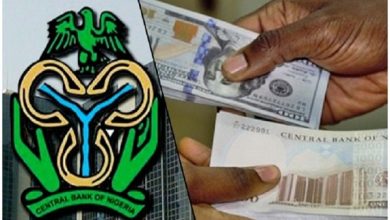Fuel Scarcity, Depots Raise Petrol Price To ₦720/Litre

Fuel scarcity is gradually surfacing in Lagos and other parts of the country as private depot owners hiked the ex-depot price of petrol from N630 to N720 per litre.
This came as fuel scarcity deepened in Abuja and the adjoining states on Sunday with some filling stations dispensing PMS as high as N900/Litre.
Our correspondents report that several filling stations in Lagos, Ogun and some states have run out of stock as they refused to buy high-priced fuel from the private depots.
Speaking in an interview with one of our correspondents on Sunday, the National Vice President of the Independent Petroleum Marketers Association of Nigeria, Hammed Fashola, said many filling stations did not open for business because they had no fuel in their tanks.
He said the Nigerian National Petroleum Company Limited, which is the sole importer of petrol at the moment, should explain to Nigerians what was happening with the product.
“Those that shut their stations do not have fuel to sell. When you don’t have fuel, you cannot open your station. That is the problem. You know the NNPC is the sole importer of this product. I think it is in the best position to tell us what is going on.
Currently, independent marketers cannot buy what the private depots are selling. They are selling fuel between N715 and N720 per litre. How much will marketers sell the product? Look at the cost of bringing it to their depots; with transportation and other depot expenses, it will be too costly for them. That is why the stations are shut down. Some marketers refuse to go and buy because they know the masses cannot afford high-priced petrol in this economy. That is the situation for now,” the IPMAN leader stated.
Our correspondents learnt that the third parties, who are private depot owners, used to sell PMS to independent marketers at the rate of N630-650/litre before now, while the NNPC sells petrol to major marketers at a price below or around N600.
On many occasions, leaders of IPMAN have appealed to the NNPC to supply them with petrol directly like they do to major marketers, but the NNPC has yet to yield to that call.
Fashola appealed to Nigerians to avoid panic buying, saying they should buy what they need so that the fuel in circulation could go around.
It was gathered that the major marketers sold petrol below N650 while the independent marketers sold between N750/litre and N800 /litre.
Multiple officials confirmed to one of our correspondents that officials of the Nigerian National Petroleum Company Limited stormed the various depots in Apapa on Friday, mandating depot owners to prioritise fuel supply to the Federal Capital Territory, Abuja, where the fuel queues were initially noticed on Friday.
Abuja prioritised
On Saturday and Sunday, many trucks were reportedly directed to Abuja to reduce the queues in the FCT, leaving Lagos and other places with little supply.
One of the officials disclosed that the NNPC was rationing PMS to depots due to the fuel supply gap.
This is coming barely three days after a report by Reuters claimed that Nigeria’s debt to suppliers of Premium Motor Spirit had surpassed $6bn, doubling what it was since early April, as the NNPC struggled to cover the gap between fixed pump prices and international fuel costs.
Although this was denied by the NNPC, the Reuters report stated that the national oil company began struggling early this year when late PMS payments surpassed $3bn.
The company, it said, had yet to pay for some January imports which traders put between $4bn and $5bn.
“The only reason traders are putting up with it is the $250,000 a month (per cargo) for late payment compensation,” one industry source said.
At least two suppliers were said to have stopped participating in recent tenders after hitting self-imposed debt exposure limits to Nigeria, meaning they will not send more PMS until they receive payments.
It was reported that Nigeria’s tenders to buy gasoline in June and July were smaller, traders told Reuters. NNPC will import via tender about 850,000 tonnes in July, according to the Reuters report quoting sources, down from the typical one million tonnes in previous months.
Meanwhile, reports gathered show some marketers have refused to supply petrol to independent marketers, who own the larger percentage of the filling stations in Nigeria. This, it was gathered, was because the depots/marketers were getting limited supplies from the NNPC.





